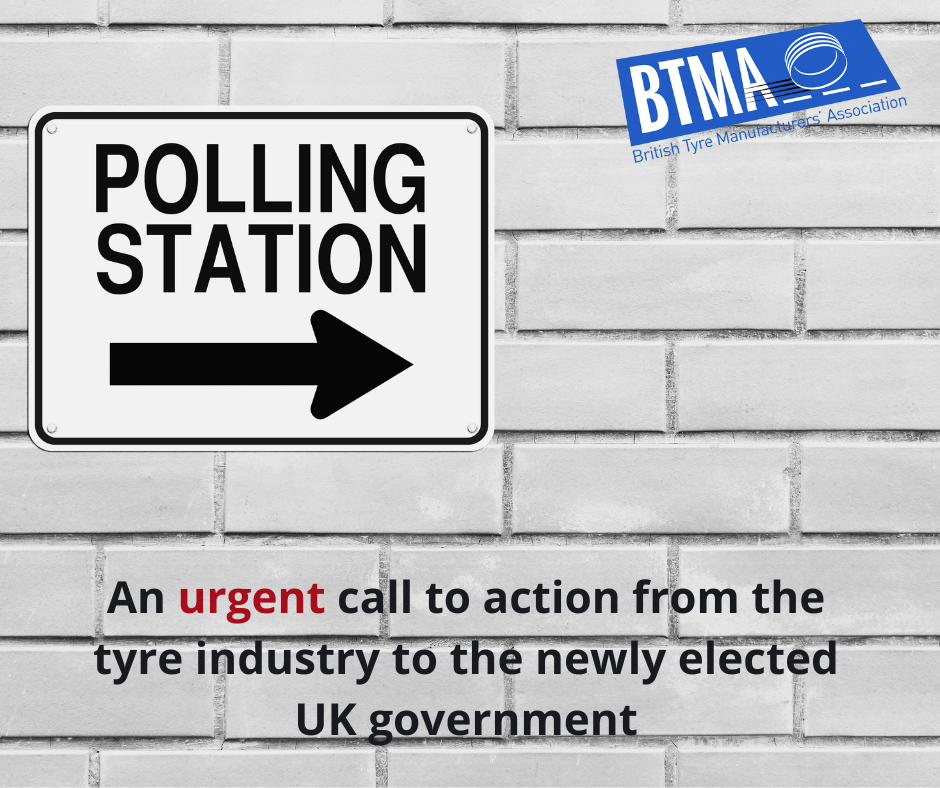The British Tyre Manufacturers’ Association is launching a comprehensive update of its widely-respected Guide to…

British Tyre Manufacturers Association Outlines Key Issues and Threats to Tyre Industry to New Government
Urging the new government elect to address high energy prices, ensure UK energy security and combat unfair trade prices
The British Tyre Manufacturers Association (BTMA) has called on the newly elected UK government to take immediate action to address the high energy costs that are threatening the competitiveness of the UK tyre manufacturing sector. With energy prices at an all-time high, the BTMA stresses the urgent need for policies that ensure affordable and cost-competitive access to renewable energy for tyre manufacturers, robust measures to secure the sector’s energy future, and decisive actions to protect the industry from unfair international trade practices.
The UK tyre industry, which is a cornerstone of the national economy and worth £1.4bn, is grappling with the dual challenges of maintaining competitiveness in a global market, seeing a 4.7% decline in revenue in the past five years. In addition, there is growing and necessary pressure to transition to sustainable practices. Energy costs, which form a significant portion of manufacturing expenses, have surged dramatically in recent years, placing undue pressure on manufacturers and threatening jobs and economic stability. The BTMA, which represents tyre manufacturers and retreaders, providing a voice for the industry in a competitive playing field, is calling on the new government to take action quickly, to ensure the stability of the sector.
So what can the new government do to support the tyre industry?
- Maintain relief on energy costs: The government should maintain measures to provide financial relief to energy intensive manufacturers. This could include subsidies, tax reliefs, or other forms of direct support to alleviate the burden of high energy costs.
- Enable long-term access to renewable energy: As the industry transitions to greener practices, it is imperative that manufacturers have access to affordable and cost-competitive renewable energy. The BTMA calls for policies that facilitate investments in renewable energy infrastructure, including wind, solar, and other sustainable sources. Such policies should aim to reduce the cost of renewable energy and ensure its reliable supply to the sector.
- Support energy-efficiency incentives: The government should extend incentives for manufacturers to adopt energy-efficient technologies and practices. This includes financial support for retrofitting existing facilities and investing in state-of-the-art, energy-saving equipment.
- Improve energy security: The BTMA stresses the importance of energy security for the manufacturing sector. This includes increased government investment in renewable energy sources to diversify and stabilise the energy supply.
- Combat unfair trade practices: The BTMA calls for strong government action to protect the tyre industry from unfair competition. The government must enforce global trade regulations rigorously and implement measures to shield domestic manufacturers from unfairly priced imports. This includes tariffs, import restrictions, and other trade defence mechanisms to ensure a level playing field for UK manufacturers.
Darren Lindsey, Chief Executive of the BTMA, expressed deep concern over the current energy landscape, stating, “The unprecedented rise in energy costs is eroding the competitiveness of our automotive sector. If immediate measures are not taken to mitigate these costs, the consequences could be dire, not only for the manufacturers but for the entire supply chain and the communities that depend on these jobs.”
He further emphasised the importance of a stable and predictable energy policy framework, “Uncertainty in energy policy is detrimental to long-term planning and investment. The government must provide clear and consistent policies that support the industry’s transition to sustainable practices while safeguarding its economic viability.”
The BTMA’s call to action demonstrates and voices the critical need for government intervention to secure the future of the UK tyre manufacturing sector. By addressing the energy cost crisis, ensuring access to renewable energy, and protecting the industry from unfair trade practices, the government can help the industry remain competitive on the global stage while contributing to the nation’s sustainability goals.
Darren Lindsey concluded “a change of government is an opportunity and a challenge for every industry, and there is so much at stake currently in our sector. Working together and constructively, it is our absolute mission and intention to support and develop solutions that will benefit the entire automotive sector and the broader economy.”
For further information about the BTMA, head to https://btmauk.com/


